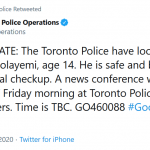
Amid fears of a possible Ebola outbreak in Nigeria during the devastating epidemic that plagued West Africa in 2014, a WhatsApp broadcast made the rounds:
“Please ensure that you and your family and all your neighbors bathe with hot water and salt before daybreak today because of Ebola virus which is spreading through the air,“it read.
Even though there was no medical basis for it, the “prescription” went viral enough for the government to officially debunk it. But that ultimately proved futile, as at least two people died and several others were hospitalized over excessive salt consumption.
The incident offered a snapshot of how misinformation spreads unchecked on social media platforms, especially WhatsApp. Crucially, older Nigerians served as key conduits for that WhatsApp broadcast as several recipients—even beyond Nigeria—say they got the broadcast from parents, grandparents, and older relatives. Given the potent mix of fear (the outbreak killed over 11,000 people across West Africa) and uncertain information about the virus and the disease, older Nigerians were particularly quick to spread the bogus prevention technique in a bid to “save” family and friends.
But that Ebola broadcast was not a one-off. With family WhatsApp groups so popular, a common complaint among younger Nigerians revolves around the barrage of forwarded messages which range from improbable to ludicrous that are shared by parents and grandparents.
But there’s an explanation for this. In some ways, WhatsApp is the internet for older users.
Unlike other social platforms which require creating and managing online profiles as well fast-moving interactions older users may be unable to keep up with, WhatsApp condenses the experience of having personal and group conversations, sharing photos and videos, receiving and sharing news into a one-stop shop platform that mirrors regular text messaging in its ease of use. “WhatsApp is the closest to SMS, which is the simplest of the lot. I don’t have to try remembering your handle or go to a platform to message you. That is appealing for everyone, not just the 60-plus age group,” says Gbenga Sesan, founder of Paradigm Initiative, a digital rights-focused social enterprise.
WhatsApp can also be thought of as a “walled garden” for a generation that’s too old to keep up with the vastness, complexity, and fast-moving pace of the wider internet. As such, just as WhatsApp is both an entry point for social media and internet use, it can also a bubble.
Part of the problem lies in how WhatsApp is structured and how it works as its biggest strength—end-to-end encryption on messages—is also its key weakness. The platform has admitted to struggling with finding ways to detect and manage the flow and impact of misinformation. WhatsApp’s potential as a tool for misinformation is further amplified by its sheer popularity: it’s the most popular messaging app across several African countries, including Nigeria. Local telecoms operators have also created WhatsApp-only data bundles for users.
You may be interested

Vitolo Announces Retirement From Football
Webby - December 22, 2024Former Spain forward Vitolo has announced his retirement from football.The former Atletico Madrid, Las Palmas and Sevilla confirmed his retirement…

La Liga: Iheanacho Missing In Real Madrid, Sevilla’s Six-Goal Thriller
Webby - December 22, 2024Super Eagles forward Kelechi Iheanacho was missing in action as Real Madrid defeated Sevilla 4-2 in Sunday’s La Liga game.Iheanacho…

Salah Makes EPL History In Liverpool’s 6-3 Win Vs Spurs
Webby - December 22, 2024Mohamed Salah was the standout performer as he bagged a brace and also provided two assists, in Liverpool’s 6-3 win…


















![American Pastor, David Wilson Seen Eating The Box Of Woman Who Isn’t His Wife [Video]](https://onlinenigeria.com/wp-content/uploads/2019/10/american-pastor-david-wilson-seen-eating-the-box-of-woman-who-isnt-his-wife-video-150x150.jpg)









